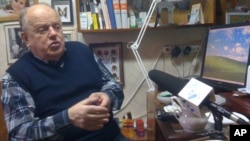The first leader of independent Belarus is calling for sanctions against his successor, Alexander Lukashenko.
After Belarus President Alexander Lukashenko jailed political rivals immediately after last month's presidential election, Belarussians started talking politics in whispers. One exception is a stocky man, with the character and bark of a bulldog.
He is Stanislav Shushkevich. In 1994, he held and lost Belarus's first free presidential election - to Alexander Lukashenko. Sixteen years later, President Lukashenko rules on, criticized by some as "Europe's last dictator."
Meeting VOA journalists in his apartment overlooking a snowy courtyard in Minsk, Shushkevich leans into a microphone and denounces the Lukashenko government as "criminals in power."
Speaking Russian, with a thick Belorussian accent he says the Lukashenko government is a criminal government, "criminals on the throne who crush their own people and their best representatives."
He says President Lukashenko spends lavishly on police making Belarus a true police state. He says the ratio is 15 people in uniform for every 1,000 people - 50 percent higher than in Russia.
He charges that President Lukashenko stole the December 19 election and then sent provocateurs to break windows at the end of a peaceful march of 40,000 protesters.
Shushkevich believes that the only way to deal with the Lukashenko government is through sanctions of the type that Washington maintains against the Belarus leadership.
He says the president, a former state manager, has no other career option than to run Belarus and he runs it like a collective farm.
He says his successor can not do anything but govern, that is why he has pathologically clings to power.
A physics and mathematics professor, Shushkevich can speak that way - he has little to lose.
President Lukashenko set the retirement pension of his predecessor at $1.10 a month. Shushkevich, the first head of Belarus after the collapse of the Soviet Union, has given up appealing before judges appointed by his successor.
To pay the bills at age 76, he works the international university lecture circuit.
The 'super universities' include Yale, Harvard, Columbia and institutions in Russia and Poland.
Admirers at a Polish university have nominated him for the Nobel Peace Prize. They cite his successful effort to rid Belarus of nuclear weapons in the early 1990s when he shipped Soviet era bombs and about 800 rockets to Russia.
Back home, Minsk's dollar-a-month man is shunned by government officials. He travels largely in diplomatic and opposition circles. He says that in the recent years, Europe betrayed the democracy movement in Belarus, entering into talks with the Lukashenko government, offering credits, and hoping to lure it toward a mainstream democratic path.
Later this month, European foreign ministers are to meet. Shocked by the beatings and arrests of opposition presidential candidates, the European Union now may follow the sanctions path advocated by Shushkevich.
After Western observers declared the elections a fraud, the foreign ministers of Germany, Poland, Sweden and the Czech Republic wrote an essay in the International Herald Tribune, warning that there cannot be 'business as usual' between the European Union and Mr. Lukashenko.
The ministers wrote, "Continued positive engagement with Mr. Lukashenko at the moment seems to be a waste of time and money. He has made his choice, and it is a choice, against everything the European Union stands for."
One week after the election, Russian President Dmitry Medvedev sent a note of congratulations to President Lukashenko on winning a fourth term. But Shushkevich believes Moscow's hold on its western periphery is destined to weaken. He says the Russian empire has not finished collapsing.
This pensioner in the modest apartment on Masherova street has seen it happen before. In December 1991, Shushkevich met with the presidents of Russia and Ukraine in a national forest near here and signed the accords that dissolved the Soviet Union.
First Leader of Belarus Calls for Sanctions Against Lukashenko




